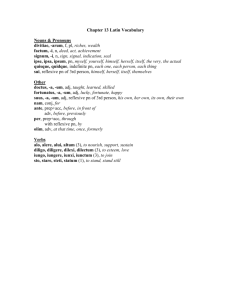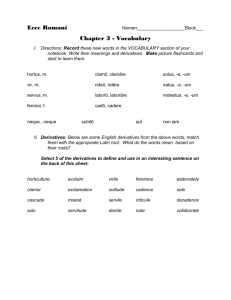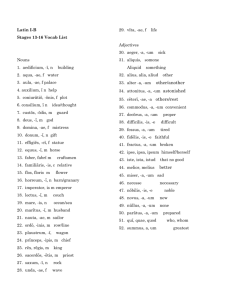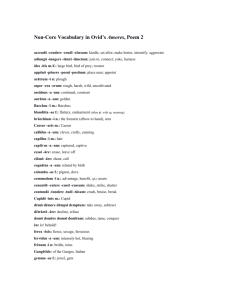Tuesday, June 3
advertisement
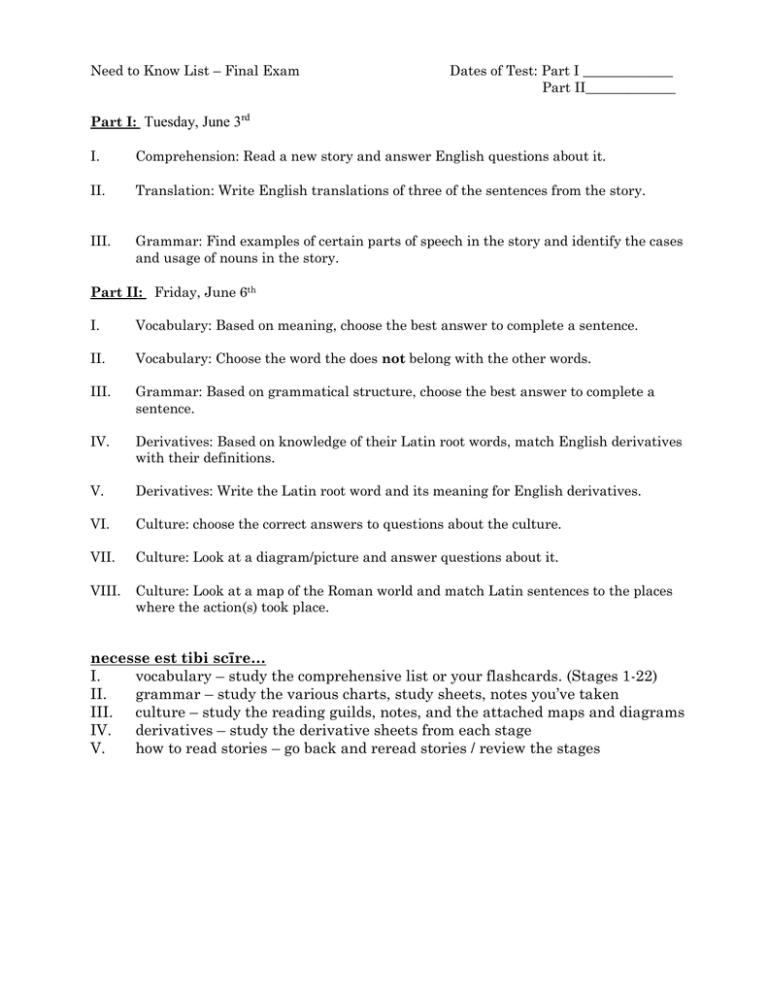
Need to Know List – Final Exam
Dates of Test: Part I _____________
Part II_____________
Part I: Tuesday, June 3rd
I.
Comprehension: Read a new story and answer English questions about it.
II.
Translation: Write English translations of three of the sentences from the story.
III.
Grammar: Find examples of certain parts of speech in the story and identify the cases
and usage of nouns in the story.
Part II: Friday, June 6th
I.
Vocabulary: Based on meaning, choose the best answer to complete a sentence.
II.
Vocabulary: Choose the word the does not belong with the other words.
III.
Grammar: Based on grammatical structure, choose the best answer to complete a
sentence.
IV.
Derivatives: Based on knowledge of their Latin root words, match English derivatives
with their definitions.
V.
Derivatives: Write the Latin root word and its meaning for English derivatives.
VI.
Culture: choose the correct answers to questions about the culture.
VII.
Culture: Look at a diagram/picture and answer questions about it.
VIII.
Culture: Look at a map of the Roman world and match Latin sentences to the places
where the action(s) took place.
necesse est tibi scīre…
I.
vocabulary – study the comprehensive list or your flashcards. (Stages 1-22)
II.
grammar – study the various charts, study sheets, notes you’ve taken
III. culture – study the reading guilds, notes, and the attached maps and diagrams
IV.
derivatives – study the derivative sheets from each stage
V.
how to read stories – go back and reread stories / review the stages
Nouns & Adjectives
Nom.
1st
-a
2nd (M)
-us
2nd (N)
-um
3rd (M/F)
varies
3rd (N)
varies
4th (M/F)
-us
4th (N)
-ū
5th
-ēs
Gen.
Dat.
Acc.
Abl.
-ae
-ae
-am
-ā
-ī
-ō
-um
-ō
-ī
-ō
-um
-ō
-is
-ī
-em
-e (-ī)
-is
-ī
varies
-e (-ī)
-ūs
-uī
-um
-ū
-ūs
-ū
-ū
-ū
-eī
-eī
-em
-ē
Nom.
-ae
-ī
-a
-ēs
-(i)a
-ūs
-ua
-ēs
Gen.
Dat.
Acc.
Abl.
-ārum
-īs
-ās
-īs
-ōrum
-īs
-ōs
-īs
-ōrum
-īs
-a
-īs
-(i)um
-ibus
-ēs
-ibus
-(i)um
-ibus
-(i)a
-ibus
-uum
-ibus
-ūs
-ibus
-uum
-ibus
-ua
-ibus
-ērum
-ēbus
-ēs
-ēbus
Nominative = Subject / Predicate Nominative
Genitive = Possession / Description / Partitive
Dative = Indirect Object / Object of Special Verbs/Used with Impersonal Verbs
Accusative = Direct Object / Object of MOST Prepositions
Ablative = Object of SID SPACE Prepositions, Ablative of Agent/Ablative of
Instrument
Adjectives
1st / 2nd Adjectives
3rd Adjectives
laetus, -a, -um
fortis, -e
iratus, -a, -um
ferox, ferocis
laetissimus, -a, -um
ingens, ingentis
Adjectives MUST agree in THREE respects…
Gender = Masculine, Feminine, Neuter
Number = Singular, Plural
Case = Nominative, Genitive, Dative, Accusative, Ablative
Comparison of Adjectives
Positive
Comparative
Superlative
laetus, -a, -um
laetior, -ius
laetissimus, -a, -um
iratus, -a, -um
iratior, -ius
iratissimus, -a, -um
fortis, -e
fortior, -ius
fortissimos, -a, -um
ferox, ferocis
ferocior, -ius
ferocissimus, -a, -um
ingens, ingentis
ingentior, -ius
ingentissimus, -a, -um
bonus, -a, -um
melior, -ius
optimus, -a, -um
magnus, -a, -um
maior, -ius
maximus, -a, -um
Adverbs
1st / 2nd Adjectives
3rd Adjectives
laetus, -a, -um → laetē
fortis, -e → fortiter
intentus, -a, -um → intentē
ferōx, ferōcis → ferōciter
cautus, -a, -um → cautē
neglegēns, -nits → neglegenter
laetissimus, -a, -um → laetissimē
audāx, audācis → audācter
Comparison of Adverbs*
Positive
Comparative
Superlative
laetē
laetius
laetissimē
fortiter
fortius
fortissimē
bene
melius
optimē
male
peius
pessimē
magnopere
magis
maximē
paulum
minus
minimē
multum
plūs
plūrimum
Pronouns
Personal Pronouns- I, you, he/she/it We, Ya’ll, They
1st / Sing.
egō
meus, -a, -um
mihi
mē
2nd / Sing.
tū
tuus, -a, -um
tibi
tē
3rd / M / Sing.
is
eius
eī
eum
3rd / F / Sing.
ea
eius
eī
eam
3rd / N / Sing.
id
eius
eī
id
Nominative
Genitive
Dative
Accusative
mē
1st / Plural
nōs
noster,-a, -um
nōbīs
nōs
tē
2nd / Plural
vōs
vester, -a, -um
vōbīs
vōs
eō
3rd / M / Pl.
eī
eōrum
eīs
eōs
eā
3rd / F / Pl.
eae
eārum
eīs
eās
eō
3rd / N / Pl.
ea
eōrum
eīs
ea
Ablative
nōbīs
vōbīs
eīs
eīs
eīs
Nominative
Genitive
Dative
Accusative
Ablative
Demonstrative Pronouns- This/These
That/Those
Masc.
Fem.
Neut
Masc.
Fem.
Neut.
Nominative
Genitive
Dative
Accusative
Ablative
hic
huius
huic
hunc
hōc
haec
huius
huic
hanc
hāc
hoc
huius
huic
hoc
hōc
ille
illius
illī
illum
illō
illa
illius
illī
illam
illā
illud
illius
illī
illud
illō
Nominative
Genitive
Dative
Accusative
Ablative
hī
hōrum
hīs
hōs
hīs
hae
hārum
hīs
hās
hīs
haec
hōrum
hīs
haec
hīs
illī
illōrum
illīs
illōs
illīs
illae
illārum
illīs
illās
illīs
illa
illōrum
illīs
illa
illīs
Relative Pronouns- Who, Which, Whom, etc
Nominative
Genitive
Dative
Masculine
quī
cuius
cuī
Feminine
quae
cuius
cuī
Neuter
quod
cuius
cuī
Accusative
Ablative
quem
quō
quam
quā
quod
quō
Nominative
Genitive
Dative
quī
quōrum
quibus
quae
quārum
quibus
quae
quōrum
quibus
Accusative
Ablative
quōs
quibus
quās
quibus
quae
quibus
Regular Verbs
Present Tense: he walks, he is walking, he does walk
ambulō, -āre, -āvī
ambulō
videō, -ēre, vīdī
videō
bibō, -ere, bibī
bibō
faciō, -ere, fēcī
faciō
audiō, -īre, -īvī
audiō
ambulās
ambulat
vidēs
videt
bibis
bibit
facis
facit
audīs
audit
ambulāmus
ambulātis
ambulant
vidēmus
vidētis
vident
bibimus
bibitis
bibunt
facimus
facitis
faciunt
audīmus
audītis
audiunt
Imperfect Tense: he was walking, he used to walk
ambulō, -āre, -āvī
ambulābam
ambulābas
videō, -ēre, vīdī
vidēbam
vidēbas
bibō, -ere, bibī
bibēbam
bibēbas
faciō, -ere, fēcī
faciēbam
faciēbas
audiō, -īre, -īvī
audiēbam
audiēbas
ambulābat
vidēbat
bibēbat
faciēbat
audiēbat
ambulābāmus
ambulābātis
ambulābant
vidēbāmus
vidēbātis
vidēbant
bibēbāmus
bibēbātis
bibēbant
faciēbāmus
faciēbātis
faciēbant
audiēbāmus
audiēbātis
audiēbant
Perfect Tense: he walked, he has walked, he did walk
ambulō, -āre, -āvī
ambulāvī
ambulāvistī
videō, -ēre, vīdī
vīdī
vīdistī
bibō, -ere, bibī
bibī
bibistī
faciō, -ere, fēcī
fēcī
fēcistī
audiō, -īre, -īvī
audīvī
audīvistī
ambulāvit
vīdit
Bibit
fēcit
audīvit
ambulāvimus
ambulāvistis
ambulāvērunt
vīdimus
vīdistis
vīdērunt
bibimus
bibistis
bibērunt
fēcimus
fēcistis
fēcērunt
audīvimus
audīvistis
audīvērunt
PluPerfect Tense: he had walked
ambulō, -āre, -āvī
ambulāveram
ambulāveras
videō, -ēre, vīdī
vīderam
vīderas
bibō, -ere, bibī
biberam
biberas
faciō, -ere, fēcī
fēceram
fēceras
audiō, -īre, -īvī
audīveram
audīveras
ambulāverat
vīderat
biberat
fēcerat
audīverat
ambulāverāmus
ambulāverātis
ambulāverant
vīderāmus
vīderātis
vīderant
biberāmus
biberātis
biberant
fēcerāmus
fēcerātis
fēcerant
audīverāmus
audīverātis
audīverant
Irregular Verbs
Present Tense
sum, esse, fuī
sum
possum, posse, potuī
possum
volō, velle, voluī
volō
nōlō, nōlle, nōluī
nōlō
ferō, ferre, tulī
ferō
es
est
potes
potest
vīs
vult
nōn vīs
nōn vult
fers
fert
sumus
estis
sunt
possumus
potestis
possunt
volumus
vultis
volunt
nōlumus
nōn vultis
nōlunt
ferimus
fertis
ferunt
sum, esse, fuī
eram
possum, posse, potuī
poteram
volō, velle, voluī
volēbam
nōlō, nōlle, nōluī
nōlēbam
ferō, ferre, tulī
ferēbam
eras
erat
poteras
poterat
volēbas
volēbat
nōlēbas
nōlēbat
ferēbas
ferēbat
erāmus
erātis
erant
poterāmus
poterātis
poterant
volēbāmus
volēbātis
volēbant
nōlēbamus
nōlēbatis
nōlēbant
ferēbāmus
ferēbātis
ferēbant
sum, esse, fuī
fuī
fuistī
possum, posse, potuī
potuī
potuistī
volō, velle, voluī
voluī
voluistī
nōlō, nōlle, nōluī
nōluī
nōluistī
ferō, ferre, tulī
tulī
tulistī
fuit
potuit
voluit
nōluit
tulit
fuimus
fuistis
fuērunt
potuimus
potuistis
potuērunt
voluimus
voluistis
voluērunt
nōluimus
nōluistis
nōluērunt
tulimus
tulistis
tulērunt
Imperfect Tense
Perfect Tense
PluPerfect Tense
sum, esse, fuī
fueram
fueras
possum, posse, potuī
potueram
potueras
volō, velle, voluī
volueram
volueras
nōlō, nōlle, nōluī
nōlueram
nōlueras
ferō, ferre, tulī
tuleram
tuleras
fuerat
potuerat
voluerat
nōluerat
tulerat
fuerāmus
fuerātis
fuerant
potuerāmus
potuerātis
potuerant
voluerāmus
voluerātis
voluerant
nōluerāmus
nōluerātis
nōluerant
tulerāmus
tulerātis
tulerant
Complementary Infinitives
The THREE Irregular Verbs, posse, velle, & nolle, require the use of a complementary
infinitive…
puerī amphorās gravēs movēre nōn possunt.
tū amphorās gravēs movēre vīs.
servus ignāvus amphorās gravēs movēre nōn vult.
There are some OTHER regular verbs which can also use the complementary
infinitive…
geminī in areā ludere amant.
lībertus dominum excitāre temptat.
nōs in magnā villā habitāre solēmus.
There are also some IMPERSONAL verb phrases which use the complementary
infinitives… {+ dative}
nōn commodum est mihi ad templum hodiē īre.
decōrum est tibi servum Aegyptium habēre.
difficile est astrologō Barbillum sanāre.
facile erat Clementī officīnam Eutychī invenīre.
melius est vōbīs cautē prōcēdere.
necesse est rēgī testamentum scrībere.
tutius est nōbīs ad vīllam Barbillī redīre.
Participles
Present Active
laudō, laudāre → laudāns, laudantis, praising
videō, vidēre → vidēns, videntis, seeing
trahō, trahere → trahēns, trahentis, dragging
capiō, capere → capiēns, capientis, making
audiō, audīre → audiēns, audientis, hearing
Perfect Passive, 4th Principal Part
laudō, laudāre, laudāvī, laudātus, -a, -um, praised, having been praised
videō, vidēre, vīdī, vīsus, -a, -um, seen, having been seen
trahō, trahere, traxi, tractus, -a, -um, dragged, having been dragged
capiō, capere, cēpī, captus, -a, -um, taken, having been taken
audiō, audīre, audīvī, audītus, -a, -um, heard, having been heard
Perfect Active, 3rd Principal Part of Special Verbs, Just MEMORIZE at this point
agressus, -a, -um, having attacked
ēgressus, -a, -um, having gone out, departed
ingressus, -a, um, having entered
regressus, -a, -um, having returned
adeptus, -a, -um, having obtained
cōnspicātus, -a, -um, having noticed
locūtus, -a, -um, having spoken
passus, -a, -um, having suffered
precātus, -a, -um, having prayed
